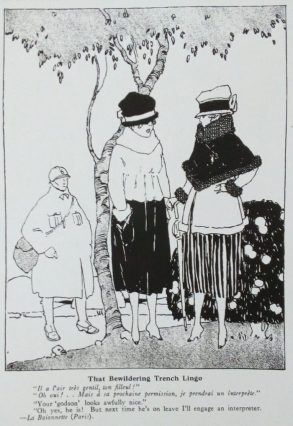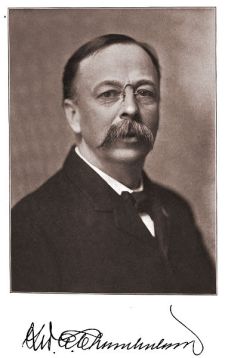I didn’t learn much about World War I in school. It was the seventies, and there was a backlash underway against the rote memorization of battle dates and that sort of thing. It was all about cause and effect. One day we’d be learning about Archduke Ferdinand and the alliances, and the next day the teacher would say, “Now, after the Allied victory…” We’d say, “Wait, what about the war?” and the teacher would ask us if we really wanted to learn about a bunch of battles. We’d say no and that would be that—on to Versailles.
So my vague impression was that the Americans came in in 1917 and gave new energy to the exhausted Allies, who won fairly quickly. A month of reading the 1918 news set me straight. As depicted in the press, the early stage of the American war effort was a colossal screw-up. American soldiers in France, short on weapons and supplies, did little but consume scarce food supplies and—judging from the humor magazines—hit on French women.*
The Wilson administration’s handling of the war was universally regarded as inept. The New Republic said in its January 19 issue that “any friend of the administration who fails at the present time to speak frankly about the effect produced by the breakdown of management of the war upon the state of mind of the public is doing to President Wilson a most indifferent service.” The fuel shortage, it said, is creating a sense that the country is “helplessly drifting into a succession of similar crises, which if they are allowed to develop will continue to paralyze American ability to assist our Allies and do harm to Germany, and which will react balefully on the morale of the nation.” And that’s what the administration’s friends were saying! (New Republic founding editor Walter Lippmann was serving as an aide to Secretary of War Newton Baker.)
Congress was so fed up that Republican Senator George Chamberlain introduced a bill to reorganize the government’s conduct of the war through the establishment of a War Council with sweeping powers, accountable only to the President. “The military establishment of America has fallen down,” Chamberlain said in a January 20 speech, because of “inefficiency in every bureau and department of the Government of the United States.” The New Republic denounced this “crude, ill considered, and indefensible measure,” but said that, if Wilson didn’t come up with better structures for the conduct of the war, “the existing mechanism will continue to creak, and groan and exasperate its victims.”
As January ended and February began, though, American soldiers completed their training and moved to the front lines. A Times correspondent reported that, as they did so, “Every man was happy just because he was going to fight at last, and as the regiments marched along the men sang joyously until they reached a point where all further operations were carried out in complete silence.”
On January 30, there was heavy shelling on an American position on the French front. Two soldiers were killed and one was captured. The Associated Press interviewed one of the wounded, a sandy-haired youth from Bismarck, North Dakota, who “said with a smile to the correspondent, ‘Did you ever hear of such bad luck? Now I’ve got a piece bit out of my leg by a shell splinter…believe me, if I ever get back to that line again—well, all I want is another chance.”
Then, on February 5, the SS Tuscania, a British ship transporting American soldiers across the Atlantic, was torpedoed by a German submarine and sunk in the Irish Sea. The British and American governments were slow to produce casualty lists, and relatives waited anxiously for days. Among them were the cartoonist Richard F. Outcault, creator of Buster Brown and the Yellow Kid, and his wife. “I am expecting hourly to hear from Dick,” Mrs. Outcault told the New York Times, “and I expect to get news soon. He is a level-headed boy, and I am sure he knew how to take care of himself in an emergency.” Richard F. Outcault, Jr., was among the survivors. 210 other families were not so lucky.
The strange air of unreality was gone. America was at war.
*UPDATE 4/1/2019: Remember when I promised to make mistakes? This is one of them. First of all, the soldier is French. And he’s not hitting on the women–one of them is his marraine, or (honorary) godmother. Marraines served as substitute mothers to soldiers without families or whose families were out of reach in German-occupied areas.



